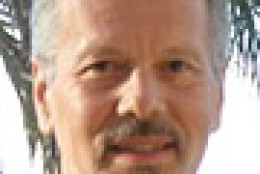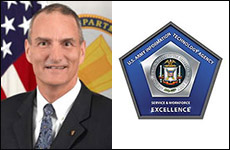Defense
-
Naval warfighters have new technology now to help it face a growing body of new threats. Peter Morrison and his team built the laser weapons system. It\'s faster to install and safer and cheaper to use than other missiles. The Navy says each laser costs less than a dollar a shot. Morrison, a program officer for the Navy Department\'s Office of Naval Research, is a finalist for a Service to America medal in the national security and international affairs category. He tells In Depth with Francis Rose why the laser is different than other weapons systems.
May 28, 2015 -
It was only a mile of fencing. The task order from the Army Corps of Engineers to Marcon Engineering looked straightforward: Build a section of barrier along the Mexican border. Then they started digging, and the project turned into a years-long legal battle. Eventually, a judge handed the government its head on a platter. Procurement attorney Joe Petrillo, a partner at the law firm Petrillo and Powell, joined Tom Temin on the Federal Drive to review the facts and lessons learned from this case.
May 28, 2015 -
More than summer road trips and barbecues, Memorial Day is a time to remember and honor. Senior Correspondent Mike Causey — and a former soldier with 30 years of service — reflect.
May 25, 2015 -
Cyber is the future of warfare, the Secretary of the Navy said in a new talk. And looking ahead he forecasts unmanned vehicles and submarines could be particularly helpful to his agency, especially as it uncovers underground mines.
May 20, 2015 -
Defense Secretary Ash Carter has nominated senior officers to lead the Army and Navy. He recommends Adm. John Richardson to be the next chief of Naval operations, and Gen. Mark Milley to be the Army\'s next chief of staff. Both now face Senate confirmation. What sorts of challenges will they face atop these military branches? Nora Bensahel, a distinguished scholar-in-residence at American University, joined Tom Temin on the Federal Drive to offer some answers.
May 19, 2015 -
The Department of the Navy plans to release the first of two requests for information this summer for the follow-on to NGEN, which could be worth $3.5 billion over five years.
May 18, 2015 -
The Department of Navy later this summer will move the Data Center and Application Optimization program office under its PEO-EIS group and out of its SPAWAR organization. Acting CIO John Zangardi said the DCAO will create a cloud brokerage hosting program with commercial and federally-approved clouds.
May 15, 2015 -
Navy proposes several changes to modernize its personnel system, many of which will require help from Congress.
May 14, 2015 -
Over the past two years, the Pentagon has been looking to prove that some of its acquisition programs don\'t need to go through every single step of the department\'s slow and byzantine process. DoD finally has identified its first test case, and is looking for more.
May 11, 2015 -
The base made famous for its large gold vault is the first in the country to operate independently from the civilian power grid, thanks to generous supplies of natural gas directly beneath it. But officials say they wouldn\'t have achieved the milestone without previous steps to invest in geothermal energy and other conservation measures.
May 08, 2015 -
New plan charts the Navy\'s strategic objectives in cyber over the next five years, with 18-month measures of progress along the way.
May 07, 2015 -
Greg Garcia, executive director of the U.S. Army Information Technology Agency will discuss the theory of virtualization and how your agency can benefit from it. May 5, 2015
May 05, 2015 -
The military branches have a template that civilian agencies could use to build their workforces for the next decade. Retired Navy Adm. John Harvey is Secretary of Veterans and Defense Affairs for the Commonwealth of Virginia. He\'s former Commander of U.S. Fleet Forces Command. On In Depth with Francis Rose, he explained the tools civilian and uniformed leaders in the military will have to build a workforce for the year 2025, and how both forces will collaborate in the coming decade.
April 30, 2015 -
Retired Navy Adm. John Harvey, a former commander of U.S. Fleet Forces Command and currently the secretary of of Veterans and Defense Affairs for the Commonwealth of Virginia, said too much civilian workforce planning is left to chance. A more structured approach and funding would make a huge difference, he said.
April 30, 2015 -
Reductions to training and modernization funding are already beginning to jeopardize the Army Reserve\'s place as an operational force within the Army, the reserve\'s top officer warned Congress Wednesday, threatening his force\'s ability to deploy in support of active duty troops.
April 30, 2015








